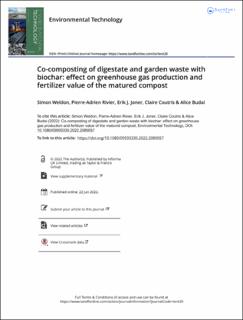| dc.contributor.author | Weldon, Simon Mark | |
| dc.contributor.author | Rivier, Pierre-Adrien | |
| dc.contributor.author | Joner, Erik | |
| dc.contributor.author | Coutris, Claire | |
| dc.contributor.author | Budai, Alice Erzebet | |
| dc.date.accessioned | 2022-07-11T10:08:01Z | |
| dc.date.available | 2022-07-11T10:08:01Z | |
| dc.date.created | 2022-06-23T11:06:48Z | |
| dc.date.issued | 2022-06-22 | |
| dc.identifier.citation | Weldon, S., Rivier, P.-A., Joner, E. J., Coutris, C., & Budai, A. (2022). Co-composting of digestate and garden waste with biochar: effect on greenhouse gas production and fertilizer value of the matured compost. Environmental Technology, 1–11. | en_US |
| dc.identifier.issn | 0959-3330 | |
| dc.identifier.uri | https://hdl.handle.net/11250/3004513 | |
| dc.description.abstract | Biogas digestate is a nitrogen (N) rich waste product that has potential for application to soil as a fertilizer. Composting of digestate is recognized as an effective step to reduce potentially negative consequences of digestate application to soils. However, the structure of the digestate and the high N content can hinder effective composting. Biochar, which can be produced through the pyrolysis of waste biomass, has shown the potential to improve compost structure and increase N retention in soils. We studied how a high-temperature wood biochar affects the composting process, including greenhouse gas emissions, and the fertilizer value of the compost product including nutrient content, leachability and plant growth. The high Biochar dose (17% w/w) had a significantly positive effect on the maximum temperature (5°C increase vs. no biochar) and appeared to improve temperature stability during composting with less variability between replicates. Biochar addition reduced cumulative N2O emission by 65–70%, but had no significant effect on CO2 and CH4 emission. Biochar did not contribute to greater retention of nitrogen (N) contained in the digestate, but had a dilution effect on both N content and mineral nutrients. Fertilization with compost enhanced plant growth and nutrient retention in soil compared to mineral fertilization (NPK), but biochar had no additional effects on these parameters. Our results show that biochar improves the composting of digestate with no subsequent negative effects on plants. | en_US |
| dc.language.iso | eng | en_US |
| dc.publisher | Informa UK Limited, trading as Taylor & Francis Group | en_US |
| dc.rights | Attribution-NonCommercial-NoDerivatives 4.0 Internasjonal | * |
| dc.rights.uri | http://creativecommons.org/licenses/by-nc-nd/4.0/deed.no | * |
| dc.title | Co-composting of digestate and garden waste with biochar: effect on greenhouse gas production and fertilizer value of the matured compost | en_US |
| dc.title.alternative | Co-composting of digestate and garden waste with biochar: effect on greenhouse gas production and fertilizer value of the matured compost | en_US |
| dc.type | Peer reviewed | en_US |
| dc.type | Journal article | en_US |
| dc.description.version | publishedVersion | en_US |
| dc.rights.holder | © 2022 The Author(s) | en_US |
| dc.source.journal | Environmental technology | en_US |
| dc.identifier.doi | https://doi.org/10.1080/09593330.2022.2089057 | |
| dc.identifier.cristin | 2034470 | |
| cristin.ispublished | true | |
| cristin.fulltext | original | |
| cristin.qualitycode | 1 | |

